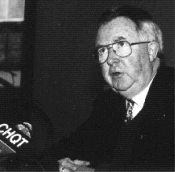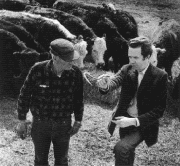

|
Joe Clark returns to his alma mater |

|
In 1959, the editor of The Gateway travelled to Quebec City to attend a national conference of the Canadian University Press-a loose organization intended to provide an exchange of news among student newspapers. The delegates decided to set up a permanent news service and approved a Charter of the Student Press delegates hoped would protect student newspapers from the threats, pressures and censorship by university administrators and faculty.
Joe Clark was a strong supporter of the news service and charter, arguing it would promote national unity and understanding. Prophetically, he argued that universities must establish national organizations in order to combat stifling provincialism.
Almost four decades later, the former prime minister and external affairs minister is returning to his alma mater-a university with a national perspective and one that slowly, but surely, rejected the "stifling provincialism" Clark had criticized four decades earlier. He won't be resuming duties as The Gateway editor, however. Instead, he will take up duties as an adjunct professor in the Faculty of Arts. He will also be an adjunct research professor in Carleton University's School of Canadian Studies. The two universities have collaborated to create The Canadian Community Project: Collaborative research related to the life and career of the Right Honorable Joe Clark. The former Prime Minister will focus on three areas: Clark family history in High River, Alberta; an autobiographical and biographical study of his own life; and an examination of the key themes in the evolution of Canadian attitudes about Canadian government, politics and foreign policy during Clark's time in government.

A young Joe Clark visits an Alberta rancher |
Faculty and graduate students at both universities will work with Clark. Both universities will provide Clark with a research assistant. History professor Dr. Paul Voisey, an expert on southern Alberta, will work with Clark on a book about High River. History professor Dr. David Mills says Clark will also work with academics to explore in depth issues such as the roots of free trade and foreign policy issues during Clark's time in government. Clark acknowledges he may not always like what emerges from this kind of collaboration, but it will inform students of history and political science. A grant application to the Social Sciences and Humanities Research Council will be made to support the project.
Clark has a long association with the U of A earning a B.A here in 1960 and an MA in 1973. His father studied liberal arts here as well. Clark was a lecturer for the political science department in the mid-'60s and was awarded an honorary LLD in '85. While a student, he was vice-president of the campus conservative club, editor of The Gateway, was McGowan Cup debater and twice the national president of the Progressive Conservative Student Federation.
His political career was meteoric. On campus, he was a vocal critic of the provincial Social Credit government, organizing a demonstration on the steps of the Legislature to lambaste the Socreds for a lack of funding for new student residences. He was involved in the rise of the Progressive Conservatives under Peter Lougheed, and narrowly missed winning election to the provincial legislature in 1967. He turned to federal politics, working as a special assistant to the Honorable Davie Fulton and later Robert Stanfield following the '67 leadership convention.
He tried his hand, once again, at electoral politics, this time in 1972 wresting a federal seat away from a Liberal incumbent in the Rocky Mountain riding. Six times he was elected to the House of Commons. In 1976, the dark horse candidate won his party's
leadership when Robert Stanfield bowed out. Three years later, he was in the prime minister's residence, 24 Sussex Drive, the youngest prime minister in Canadian history. But his minority government didn't last a year, and once again Clark found himself on the opposition benches.
When the Tories returned to power in 1984 under Brian Mulroney's leadership, Clark was appointed Secretary of State for External Affairs, where he served admirably from 1984 to 1991. In the early '90s, he became minister responsible for constitutional affairs.
![[Folio]](http://www.ualberta.ca/~publicas/folio/gif/small/folio.gif)
Folio front page |
![[Office of Public Affairs]](http://www.ualberta.ca/~publicas/gif/small/opahome.gif)
Office of Public Affairs |
![[University of Alberta]](http://www.ualberta.ca/~publicas/gif/small/uahome.gif)
University of Alberta |